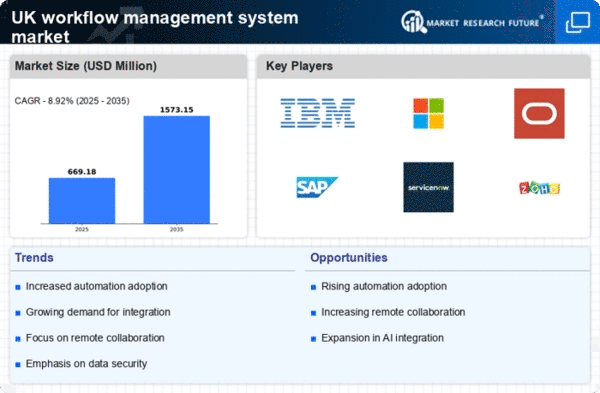Shift Towards Remote Work Solutions
The ongoing shift towards remote work is significantly influencing the workflow management-system market. With a growing number of employees working from home, organisations are seeking robust systems that support remote collaboration and task management. Data indicates that 70% of UK companies have adopted some form of remote work, necessitating the integration of effective workflow management solutions. These systems enable teams to maintain productivity and communication, regardless of location. Consequently, the demand for workflow management systems that cater to remote work environments is expected to rise, further propelling market growth.
Emphasis on Data-Driven Decision Making
The workflow management-system market is witnessing a growing emphasis on data-driven decision making. UK organisations are increasingly leveraging data analytics to inform their operational strategies and improve efficiency. By integrating workflow management systems with data analytics tools, businesses can gain insights into process performance and identify areas for improvement. This trend is supported by findings that suggest companies utilising data-driven approaches can enhance productivity by up to 20%. As the importance of data in decision making continues to rise, the workflow management-system market is likely to expand, driven by the need for systems that facilitate data integration and analysis.
Rising Demand for Operational Efficiency
The workflow management-system market is experiencing a notable surge in demand for operational efficiency among UK businesses. Companies are increasingly recognising the need to streamline processes, reduce redundancies, and enhance productivity. According to recent data, organisations that implement effective workflow management systems can achieve up to 30% improvement in operational efficiency. This trend is driven by the competitive landscape, where businesses strive to optimise resources and reduce costs. As a result, the workflow management system market is expected to grow as firms invest in solutions that facilitate better task management and collaboration.
Growing Adoption of Cloud-Based Solutions
The transition to cloud-based solutions is reshaping the workflow management-system market in the UK. Businesses are increasingly recognising the advantages of cloud technology, including scalability, flexibility, and cost-effectiveness. Recent statistics reveal that over 60% of UK organisations are now using cloud-based workflow management systems. This shift allows for easier access to data and collaboration across teams, regardless of geographical barriers. As more companies migrate to the cloud, the workflow management system market is set for substantial growth, driven by the demand for innovative and accessible solutions.
Increased Focus on Compliance and Risk Management
In the context of the workflow management-system market, there is an increasing emphasis on compliance and risk management. UK businesses are under pressure to adhere to stringent regulations and standards, which necessitates the implementation of systems that can track and manage compliance-related tasks. Research suggests that companies utilising workflow management systems can reduce compliance-related risks by up to 25%. This focus on regulatory adherence is driving organisations to invest in solutions that not only streamline processes but also ensure compliance, thereby enhancing the overall value of the workflow management-system market.
















